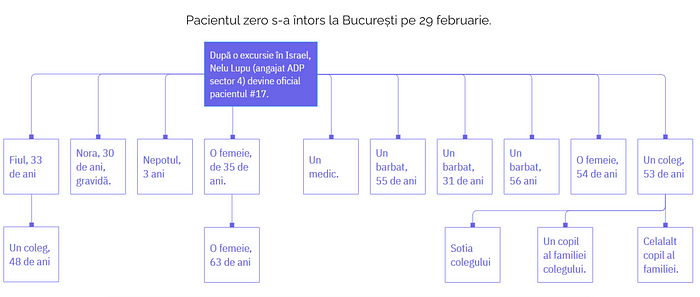
Case study
Inside Buletin de București’s attempts to uncover Romania’s ‘patient zero’
In a nutshell
This team of five Bucharest-based journalists and five freelancers focused their investigations and video content on Romania’s government procurement scandal and figuring out the story behind the country’s first case of COVID-19.
What is Buletin de București?
- Buletin de București (Bucharest Bulletin) is a local news site that informs readers about what is happening in Bucharest, Romania’s capital. It was launched in the spring of 2019 by Funky Citizens, a nonprofit association that builds research-based, data-driven online advocacy tools to help young citizens understand and engage in government accountability. With the help of a grant obtained from Google’s Digital News Initiative, Buletin de București sought to combine data and local journalism in a way that hadn’t been tried in Romania before. The team is made up of five staff members and five freelancers.
- The outlet’s target audience is young Romanians who seek news about what is happening in the capital and care about holding the government to account. Buletin de București traditionally attracts 30,000 monthly readers to its website but its online audience more than tripled during the pandemic. According to digital analytics, 80% are aged between 25–44 years old.
- Despite media freedom being enshrined as a basic principle in Romania’s constitution, the country has experienced a rapid decline in recent years and now ranks 48th out of 180 countries in the RSF World Press Freedom Index. Romania has highly concentrated media ownership, which is viewed as a growing threat to press freedom and democracy. In recent years, journalists have experienced numerous attacks. In August 2018, 15 foreign and local journalists were subjected to physical and verbal violence by riot police, actions that were later defended by Romania’s Minister of Justice. Independent news outlets like Buletin de București are viewed by many as a lifeline for the country given the limited trust in legacy media.
- Buletin de București is currently free to read with no paywall or membership programme. The team hopes to roll out of a paid membership programme in the next three to five years. The team’s concern is that Romanians aren’t yet used to paying for online news. At present only a few news sites — for example, digital magazine Decât o Revistă and business and real estate site Romania Insider — offer a paid membership. Most organisations are funded by advertising.
How did Buletin handle the COVID-19 crisis?
- The Buletin de București team placed a strong emphasis on video during its coverage of the pandemic. Their rationale was that Romanian audiences are very sensitive to video reportages and, according to its editor-in-chief, “only believe something if they see it”. This approach is supported by research from Reuters Institute’s Digital News Report 2020 that shows that broadcast news is one of the most popular sources of news in the country. Two of Buletin de București’s current staff are former television journalists and led the creation of COVID-19 content, including interviews with experts as well as digital video packages about the virus. Some videos showing positive stories of people helping others during lockdown featured in the Good News Bulletin, a section on their website. To date, 17 different stories have been published in this section.
- The team produced two dozen videos including one about a mayor in a town near Bucharest who gave voters food during the pandemic. Receiving items from candidates during election campaigns is not uncommon in Romania, but the video demonstrated local representatives using the health crisis politically to their advantage. Another notable video showed the Bucharest mayor announcing she would make a hospital for Covid-19 patients (Although it was inaugurated, the hospital was never actually finished). Their audience gave supportive feedback of these videos and suggested further story ideas over email and Facebook Messenger to help shape its coverage.
- Investigations also played a pivotal role in Buletin’s coverage and, in particular, one ongoing story about corruption in COVID-19 procurement. The team decided to look into this because the state of emergency meant that the direct procurement limit of €30,000 was lifted. This led to contracts being awarded without the usual government auctions. For example, a series of three in-depth articles looked at acquisitions made by the Bucharest police force with powers provided by the emergency decree. The police force sought to take Buletin de București to trial and to have the articles removed from the articles from its site. A judge considered that the organisation’s reporting was fair and rejected their application, but the verdict was appealed and the trial continues.

- Another strand to its Buletin de București’s investigations was to identify Romania’s patient zero. This was an important story because he worked in a public institution and was believed to have been the source of half of the COVID-19 cases in Bucharest at the time. Through a tipoff from a contact, they found out who he was and that he had travelled to Israel prior to testing positive for COVID-19. They traced his steps, the people he had contact with and where he went prior to his diagnosis. The story also uncovered that he lied to the doctors about travelling from a country which had a high number of COVID-19 cases and did not declare that he flew by plane with 88 people, many of which were ill. The team reached out to him, but he refused to talk. The articles published on Buletin’s site never revealed his name or any details by which people could identify him.
- The team also sent a daily COVID-19 newsletter, which updated readers on the daily death toll and charted the spread of the virus in Romania. It also included main articles of the day and a piece from the Good News Bulletin. Around 200 subscribers have signed up to date. The team decided to stop sending the newsletter every day when the government ended the state of emergency on May 13 and cases dropped to 190 per day. However, a spike in new cases in July (the highest day to date was 698 cases on 12 July) meant the team started sending the newsletter on a daily basis this week.
- Buletin de București (through Funky Citizens) received €50,000 from the European Journalism Centre’s European Journalism COVID-19 Support Fund, developed in partnership with Facebook Journalism Project. It was one of five European press organisations that received funding for innovation projects out of a total of over 1800 applicants. With the funding, Buletin de București and Funky Citizens will build a whistleblowing platform for people working in the medical profession. It will also produce how-to-guides to explain to potential leakers how to use the platform and to assure them about the confidentiality of the system.
- Just a few weeks ago, at the start of July, Romania experienced a rise in COVID-19 cases which is still ongoing. As a result of this spike, Buletin readers asked the team to restart the newsletter and to double down on data related to the virus across all of Romania’s 42 counties. From this, the team has developed a new data visualisation showing the spread and growth of COVID-19. The team also decided to inform readers about the restrictions put in place in other countries where COVID-19 cases continue to rise.
How has COVID-19 changed the future of Buletin de București?
- In the future, Buletin de București plans to divide the organisation into different teams that will be responsible for different aspects of its output. For instance, one team will handle the daily news, another would conduct investigations or reportages, and another look after video production. The amount of audience interaction has also grown exponentially since the pandemic hit. For instance, the team has received a lot of emails and messages on Facebook Messenger with different story ideas and suggestions about what people want to read. The team is considering how they bring in human resources to facilitate this ongoing interaction with its community.
- Prior to the pandemic, Buletin de București planned to host a fundraiser in Spring 2020 ahead of Romania’s local elections. However, the team decided to put it on hold as it felt immoral to ask the public to donate money when doctors and nurses didn’t have enough personal protective equipment. The team will now crowdfund from 1 August and use the money to fund journalists that can help strengthen its COVID-19 coverage. The new funds will also help them to develop Buletin de Ilfov, which is the metropolitan area around Bucharest that is poorly covered by mass media coverage.
- In terms of future coverage, Buletin will continue to focus on investigations related to the medical system but will also turn its attention to the upcoming local elections at the end of September. The aim is to have the whistleblower platform ready in time to encourage people to contribute leaks and information to these stories.
- Buletin de București has the ambition to extend beyond Bucharest into the suburbs, villages and towns outside the capital. Not only are these communities growing faster, but many people from the capital are also seeking to move outside Bucharest. These people will still have a need for local news to keep them informed. There are some obstacles to doing so, however: According to the Romanian Centre for Independent Journalism, local authorities reportedly put pressure on local media to publish favourable content in exchange for publicly funded advertising. An investigation by Recorder, an independent news site, found that town halls pay an estimated €3 million a year for advertisements in local papers.
What have they learned?

“The most important thing we have learned from the COVID-19 crisis is that we have the ability to mobilise extremely well in times of crisis. We also have learned that readers refer to us as a benchmark of communication in terms of public procurement and data journalism. We also understood that local journalism is the basis of all journalism and, therefore, in the future, we plan to expand our publication to other major cities in Romania.”
Oana Despa, editor-in-chief, Buletin de București
This case study is part of Resilience Reports, a series from the European Journalism Centre…
